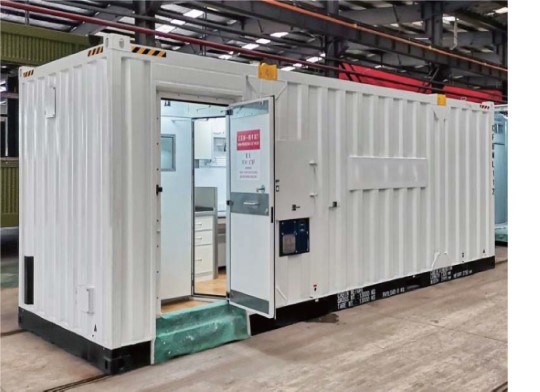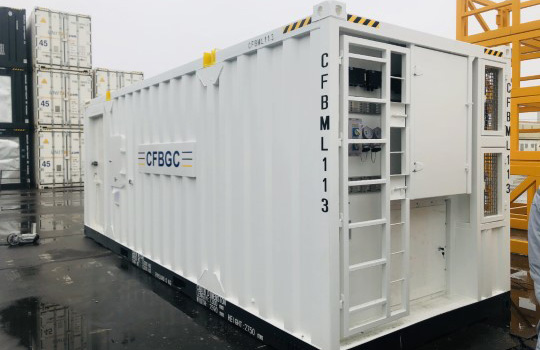Offshore energy production has gained significant momentum over the past few decades, driven by advancements in technology and the ever-increasing global demand for energy. Offshore modules, which are self-contained units used for various functions in offshore oil and gas production, play a crucial role in this sector. These modules encompass a range of functionalities including processing, living quarters, power generation, and more. This article delves into the key benefits of using it for energy production, highlighting their contributions to efficiency, safety, environmental sustainability, and economic viability.

1. Enhanced Efficiency and Flexibility
- Modular Design and Scalability
One of the primary benefits of offshore modules is their modular design. This feature allows for scalability, meaning additional modules can be added or removed based on the specific needs of the operation. This flexibility is particularly advantageous for energy companies looking to scale their operations up or down without significant delays or costs.
- Reduced Installation Time
They are typically pre-fabricated onshore and then transported to the site for installation. This approach significantly reduces the time required for construction compared to traditional methods. Pre-fabrication ensures that the modules are built under controlled conditions, adhering to strict quality standards, and minimizing the risk of delays caused by adverse weather conditions or logistical issues at sea.
- Standardization and Replicability
The use of standardized offshore modules allows for replicability across different sites. Once a module design proves successful, it can be replicated for other projects, ensuring consistency in quality and performance. This standardization also simplifies the maintenance and repair processes, as spare parts and expertise can be shared across multiple installations.
2. Improved Safety
- Controlled Manufacturing Environment
The manufacturing of offshore modules in controlled environments significantly enhances safety. Quality control is more stringent, and the modules undergo thorough testing before deployment. This reduces the risk of defects and failures that could lead to accidents or operational disruptions once the modules are installed offshore.
- Reduced On-site Construction Risks
On-site construction of offshore facilities is fraught with risks, including harsh weather conditions, high seas, and remote locations. By pre-fabricating modules onshore, these risks are minimized. Workers are safer, and the need for extensive on-site construction crews is reduced, lowering the potential for accidents and health hazards.
- Integrated Safety Features
They are designed with integrated safety features, such as fire suppression systems, emergency shutdown mechanisms, and escape routes. These features are rigorously tested during the manufacturing process, ensuring they function correctly in the event of an emergency. This comprehensive approach to safety helps protect personnel and equipment, reducing the likelihood of catastrophic incidents.

3. Environmental Sustainability
- Reduced Environmental Footprint
The modular approach to offshore energy production reduces the environmental footprint of construction activities. Since modules are built onshore, there is less disruption to marine ecosystems during the construction phase. Additionally, the efficiency of modular installations often results in fewer emissions and lower fuel consumption compared to traditional construction methods.
- Advanced Waste Management Systems
Many offshore modules are equipped with advanced waste management systems that minimize environmental pollution. These systems include waste segregation, treatment, and disposal mechanisms that comply with stringent environmental regulations. By incorporating these systems into the design, they contribute to more sustainable energy production practices.
- Energy Efficiency and Emission Reduction
They often incorporate the latest energy-efficient technologies, such as low-emission power generation units and energy recovery systems. These innovations help reduce the overall carbon footprint of offshore energy production, aligning with global efforts to combat climate change. By adopting energy-efficient practices, they contribute to the long-term sustainability of the energy sector.
4. Economic Viability
- Cost-Effective Production
The modular approach to offshore energy production is generally more cost effective than traditional methods. Pre-fabrication reduces labor costs and construction time, while standardization lowers the expenses associated with custom design and engineering. Additionally, the ability to add or remove modules as needed allows companies to optimize their capital expenditures based on demand.
- Reduced Operational Costs
Offshore modules are designed for ease of maintenance and operation. Standardized designs mean that spare parts and expertise are readily available, reducing downtime and maintenance costs. The durability and reliability of modular units also translate to fewer unexpected repairs and replacements, further lowering operational expenses.
- Extended Asset Life
The high-quality construction of it ensures that they have a long operational life. Built to withstand harsh marine environments, these modules are more resilient to wear and tear, extending the lifespan of offshore installations. This longevity reduces the need for frequent replacements, offering long-term cost savings for energy companies.
5. Technological Advancements
- Integration of Cutting-Edge Technology
Offshore modules are often at the forefront of technological advancements in the energy sector. They integrate the latest innovations in automation, remote monitoring, and data analytics, enabling more efficient and effective operations. These technologies enhance the ability to monitor and control production processes in real time, leading to better decision-making and optimized performance.
- Improved Operational Control
The integration of advanced control systems in offshore modules allows for precise management of production processes. Automated systems can quickly respond to changes in operating conditions, ensuring optimal performance and reducing the risk of human error. Remote monitoring capabilities also enable operators to oversee operations from onshore control centers, enhancing safety and efficiency.
- Enhanced Data Management
They are equipped with advanced data management systems that can collect, analyze, and store vast amounts of operational data. This data provides valuable insights into performance trends, equipment health, and production efficiency. By leveraging these insights, companies can implement predictive maintenance strategies, optimize resource allocation, and improve overall operational efficiency.
6. Strategic Advantages
- Access to Remote Reserves
Offshore modules provide access to remote and deepwater reserves that are otherwise challenging to exploit. Their modular nature allows for flexible deployment in various offshore environments, including those with harsh conditions. This capability opens up new opportunities for energy production in untapped regions, contributing to global energy security.
- Enhanced Competitiveness
The efficiency, cost-effectiveness, and reliability of offshore modules enhance the competitiveness of energy companies in the global market. By adopting modular solutions, companies can respond more swiftly to market demands, reduce operational costs, and increase production efficiency. These advantages position them favorably in an increasingly competitive industry.
- Support for Renewable Energy Initiatives
They are not limited to traditional oil and gas production; they are also instrumental in the development of offshore renewable energy projects, such as wind and wave energy. Modular platforms can be adapted to support various renewable energy technologies, contributing to the diversification and sustainability of the global energy mix.
Conclusion
The use of offshore modules in energy production offers numerous benefits, from enhanced efficiency and flexibility to improved safety, environmental sustainability, and economic viability. These advantages are driven by its modular design, advanced technology integration, and strategic capabilities. As the energy industry continues to evolve, the adoption of modular solutions will play a crucial role in meeting the growing demand for energy while ensuring operational excellence and sustainability. By leveraging the key benefits of offshore modules, energy companies can navigate the challenges of offshore production and capitalize on new opportunities in a dynamic and competitive landscape.
CIMC Yang Zhou Base is a leading manufacturer of offshore modules and various other standard and special logistics equipment. With years of experience in the industry, it focuses on the design, production and distribution of high-quality innovative products that meet the specific needs of customers.
If you need high-quality and innovative logistics equipment, including refrigerated containers, cold chain equipment, containerized equipment integration, modular buildings, etc., База CIMC Ян Чжоу is your best choice. Welcome inquiries from customers all over the world and look forward to the opportunity to cooperate with you.


